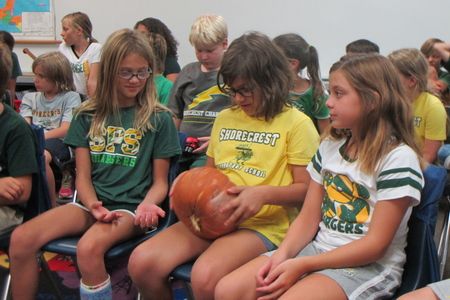

Grade 4 Year-Long Composting Project
Source/Author: Ms. Oman
September 12, 2014
Fourth grade is beginning an in-depth investigation on composting. Our endeavors will be driven by the essential question, "How Does Matter Change?"
Students will be problem solving, investigating and actively learning about this real world topic. While deeply involved in this project, they will build skills including how to work in teams, make presentations, think critically and solve problems. Students will gain confidence in their abilities as they take ownership of their learning.
Students will be problem solving, investigating and actively learning about this real world topic. While deeply involved in this project, they will build skills including how to work in teams, make presentations, think critically and solve problems. Students will gain confidence in their abilities as they take ownership of their learning.
Phase 1: Students will share what they know about composting and where they have seen it. During this time, we will have expert presenters build the foundation of knowledge of composting and get them excited about our new study. We will study the process of decomposition and chemical reactions in the classroom including an ongoing experiment called “Natural Decomposers”. Students will reach out to our Shorecrest community by creating video presentations and making personal visits to classrooms, staff and administration requesting coffee grounds, food scraps and yard waste from our community.
Phase 2: we will learn how combining material that primarily releases carbon (think brown- like leaves, paper, dried branches and twigs) with material that primarily releases nitrogen (think green- like fruit, vegetables, grass, coffee grinds) actually cause a chemical reaction that creates a high heat that aides in the decomposition of all the matter. Students will be actively engaged in four different compost bins and will be observing, monitoring, journaling and conducting field work on this topic. They will also view educational videos, read about this topic in articles and books, and they will research onthe Internet. Conducting hands-in-the-dirt experiments at school is a highlight for many students. Once our composting bins are set up, we will allow the decomposition to take place and students will step back from their regular participation and will only be required to turn the compost and check for proper moisture. During this reprieve, we will start a personal project grounded in all of the background knowledge that they have been acquiring.
Students will choose their own related topic of interest as they investigate a chemical change of their own choosing. Following their own driving question with a small group (or possibly individually) they will research and gather as much knowledge on their topic as possible. Most of this work will be done at school, but students may find that research may be done at home or while gathering answers to their questions during their homework time.
Phase 3: During our culminating Project Share event, students will present their findings. These representations will be in the form of videos, physical demonstrations, visual displays, technology-based creations, etc. Parents, administration and fellow students will be in attendance (dates will be forthcoming).
Phase 4: In the spring, we will add worms to the compost bins and let them finish off any parts of the compost that have not broken down to the desired consistency. It is a favorite and special activity for the students. When our compost is ready, we will take a fieldtrip to Zoe’s Garden at All Children’s Hospital and add our compost to the garden there. This adds a rewarding service learning component to our project. Our students will be giving a very personal gift to those less fortunate.
Everyone can support this project by discussing places where you notice composting, and by sending in coffee grinds, fruit and vegetable scraps and yard clippings. You can also encourage your child to think and ask questions about this topic. If you or someone you know could be a guest expert (you only need to know more than the students do about a topic pertaining to chemical reactions or composting) please let us know. We hope that you celebrate with us along the way and can assist when you can on this project.
Everyone can support this project by discussing places where you notice composting, and by sending in coffee grinds, fruit and vegetable scraps and yard clippings. You can also encourage your child to think and ask questions about this topic. If you or someone you know could be a guest expert (you only need to know more than the students do about a topic pertaining to chemical reactions or composting) please let us know. We hope that you celebrate with us along the way and can assist when you can on this project.























![Commotion in the Ocean with First Grade [Video, Photos] Commotion in the Ocean with First Grade [Video, Photos]](/Images/1px.png?command_1=url&url_1=https%3A%2F%2Fwww.shorecrest.org/userfiles/shpsv2mvc/images/news-images/commotionocean2024.jpg&command_2=resize&height_2=85)
